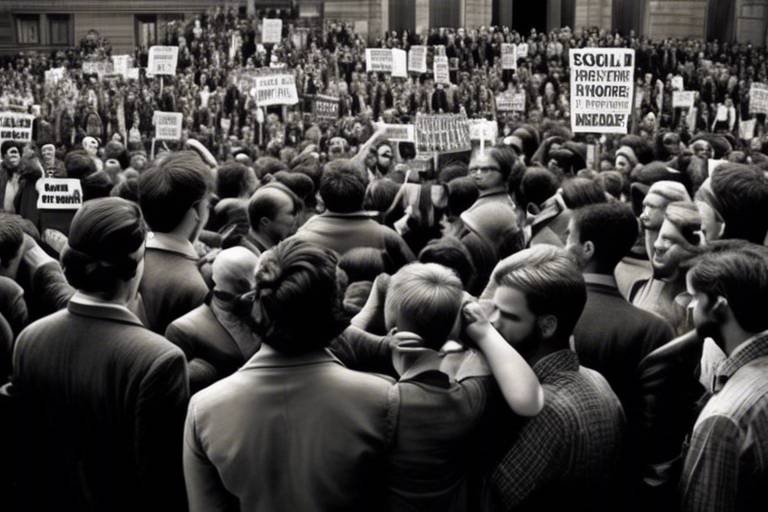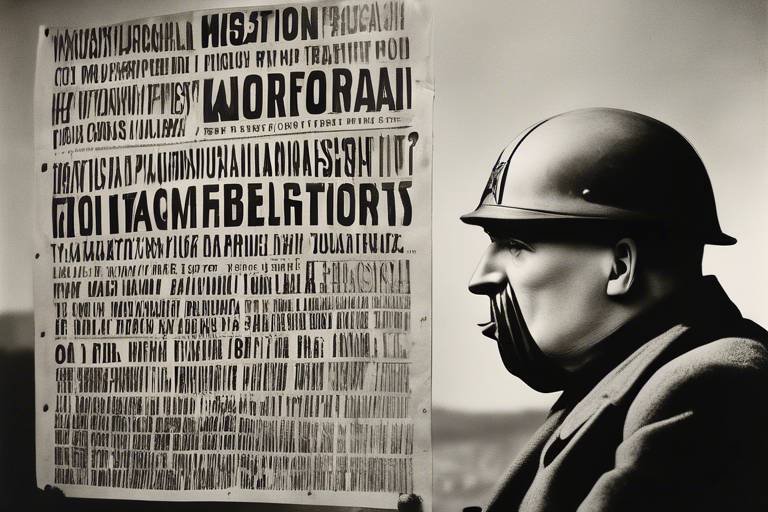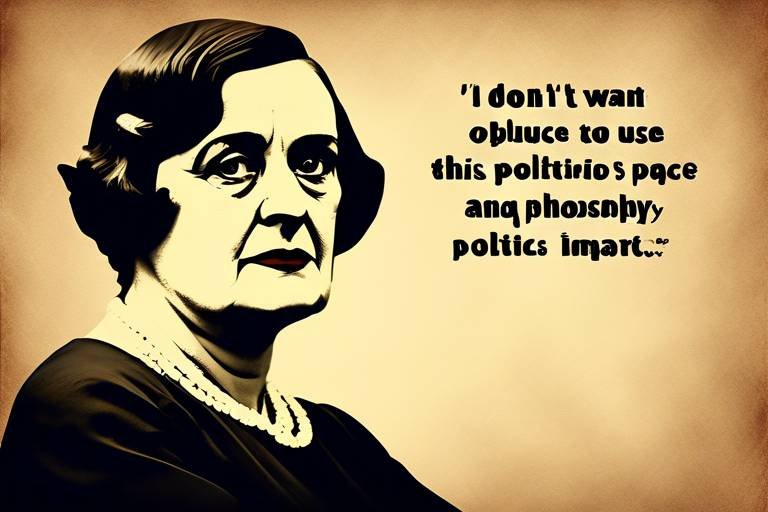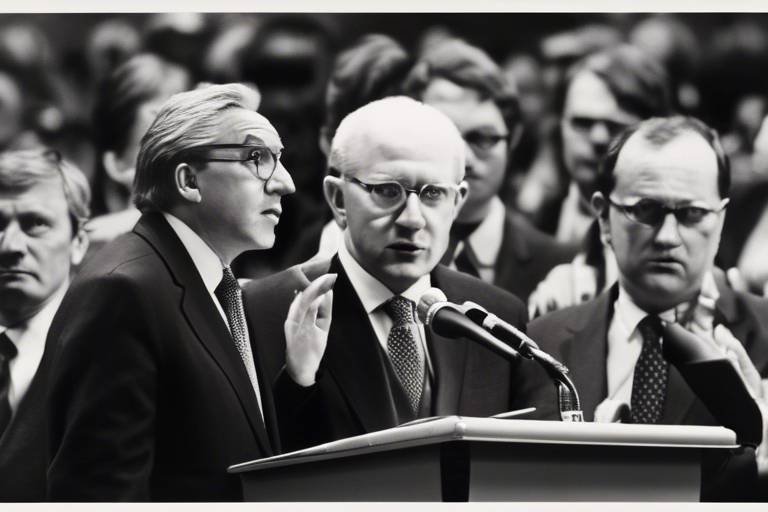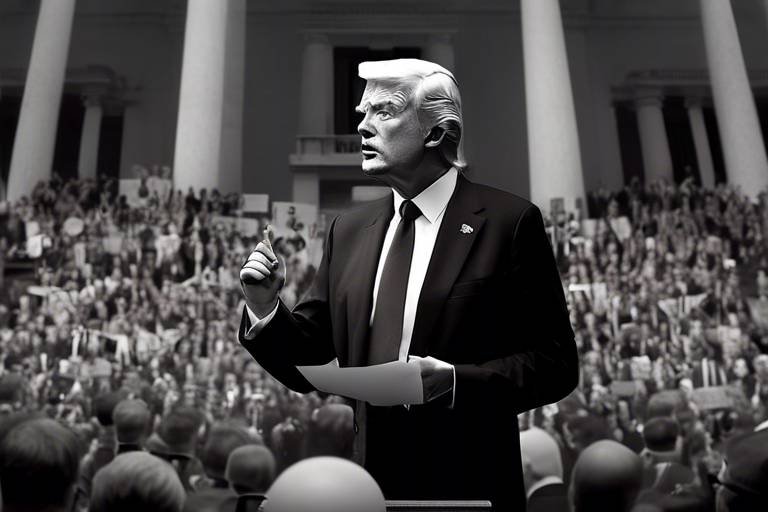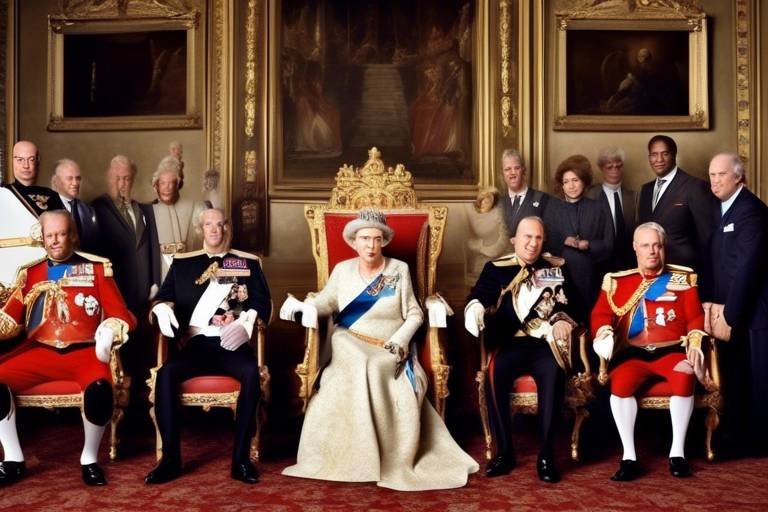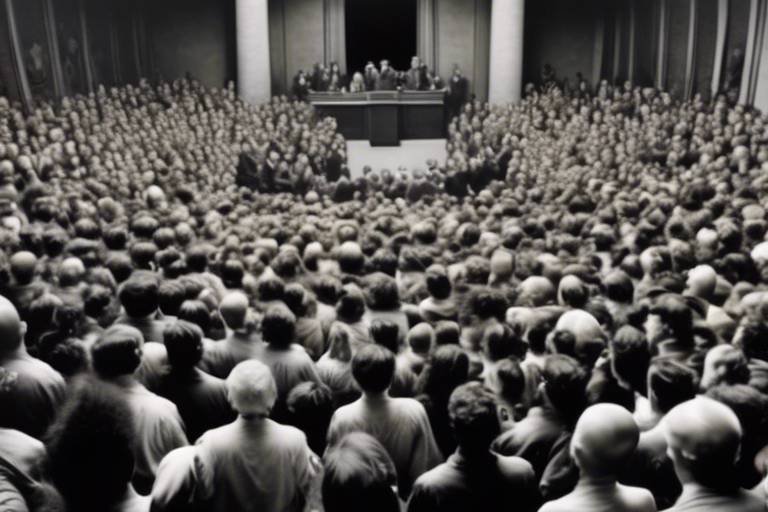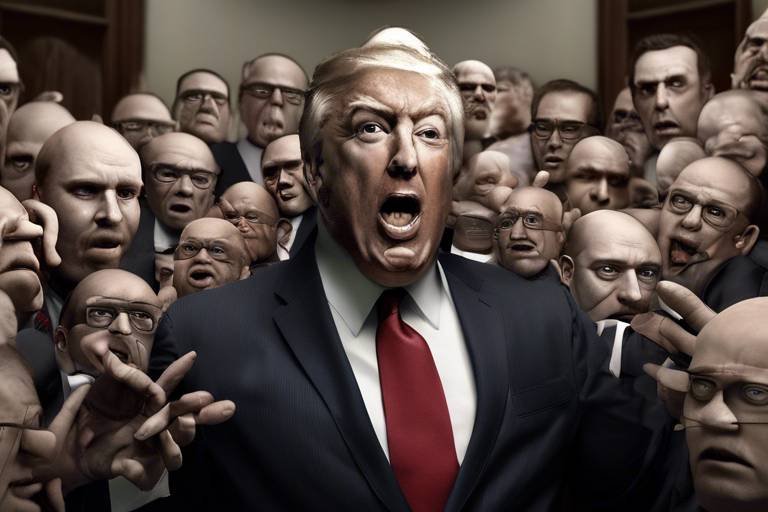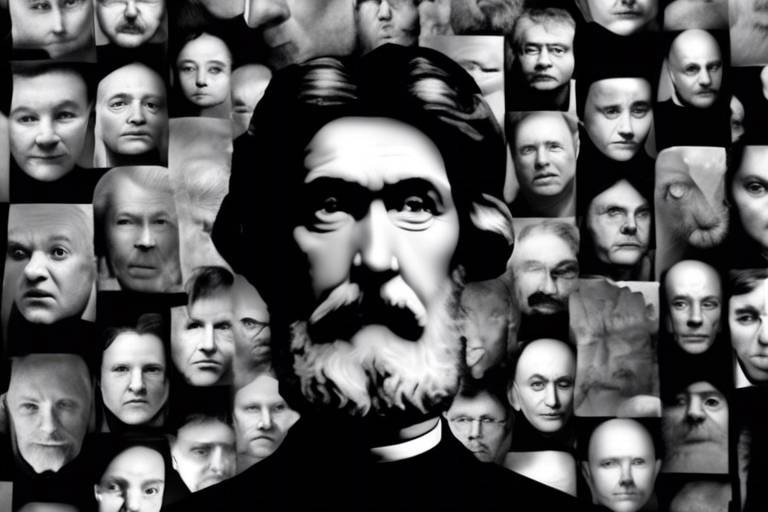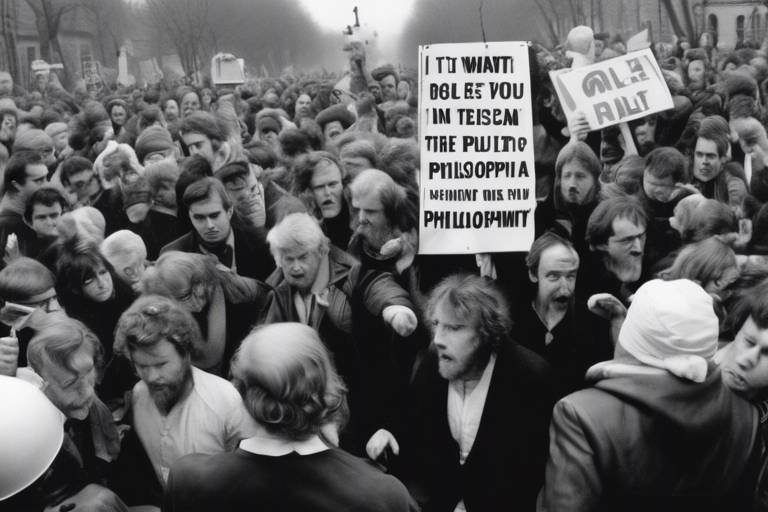The Impact of Nietzsche's Philosophy on Politics
Nietzsche's philosophical ideas have long cast a shadow over the realms of politics and governance, challenging the very foundations upon which societies are built. His thoughts provoke a deep examination of power, morality, and individualism, making them relevant to contemporary discussions surrounding political ideologies and movements. But what exactly makes Nietzsche’s philosophy so impactful? To understand this, we must delve into his core concepts, which not only question the status quo but also inspire radical transformations in political thought.
At the heart of Nietzsche's philosophy lies the idea that traditional moral values are often outdated and stifling. He encourages individuals to break free from these constraints and create their own values—values that can lead to transformative political movements. This notion of self-creation and personal empowerment resonates deeply in today's political landscape, where many are seeking alternatives to established norms. Nietzsche's challenge to conventional morality urges us to consider: Are our current political systems truly serving us, or are they merely relics of a bygone era?
Moreover, Nietzsche's exploration of nihilism raises profound questions about meaning and purpose in politics. In a world where traditional beliefs are increasingly questioned, nihilism can lead to both despair and a powerful impetus for change. It invites individuals to confront uncomfortable truths about their societies and encourages a reevaluation of the structures that govern them. This duality of nihilism—its potential to paralyze or empower—illustrates the complexity of Nietzsche’s influence on political thought.
Central to Nietzsche's philosophy is the concept of the Will to Power. This idea posits that the fundamental driving force in humans is not merely survival or reproduction, but a profound desire to assert and enhance one's power and influence. This perspective has significantly influenced political theories that emphasize strength, ambition, and the relentless pursuit of dominance. In practical terms, this can manifest in various ways, from political leaders who embody this drive to social movements that seek to disrupt the status quo. Nietzsche's insights compel us to ask whether our political leaders are motivated by a genuine desire to serve the public or by a more self-serving ambition to exert control.
As we navigate the intricate web of power dynamics in society, Nietzsche's work sheds light on the underlying forces that shape political relationships. Understanding these dynamics is crucial for effective governance and social organization. He believed that power is not merely held by those in authority but is constantly negotiated and contested in various social contexts. This insight can help us grasp the complexities of modern governance, where power is fluid and constantly shifting.
Additionally, the Will to Power serves as a source of inspiration for those resisting oppression. Nietzsche encourages individuals and groups to assert their strength and challenge unjust systems, reminding us that resistance is not only a right but a necessary response to tyranny. This notion has been pivotal in many political movements, empowering activists to stand up against oppressive regimes and fight for justice.
Nietzsche's critique of traditional morality also raises important questions about the legitimacy of political authority. He suggests that moral frameworks are often employed to justify power rather than promote justice, leading to a critical examination of how laws and societal norms are established. This perspective urges us to reflect on the moral underpinnings of our political systems and consider whether they genuinely serve the common good or merely reinforce the status quo.
In conclusion, Nietzsche's philosophy provides a rich tapestry of ideas that continue to influence political thought today. His exploration of power, morality, and individualism invites us to engage in a deeper dialogue about the nature of governance and the role of the individual in society. As we grapple with these complex issues, Nietzsche’s insights challenge us to rethink our political frameworks and seek out new paths toward justice and empowerment.
- What is the Übermensch?
The Übermensch, or "Overman," is a concept introduced by Nietzsche that represents an individual who transcends conventional morality to create their own values. - How does nihilism relate to politics?
Nihilism raises questions about the meaning and purpose of political systems, leading to both despair and the potential for radical change. - What is the Will to Power?
The Will to Power is a fundamental concept in Nietzsche's philosophy, suggesting that the primary driving force in humans is the desire to assert and enhance their power. - How has Nietzsche influenced modern political thought?
Nietzsche's philosophy continues to resonate in contemporary political discourse, influencing theorists and activists grappling with issues of power and morality.

The Concept of the Übermensch
The concept of the Übermensch, or "Overman," is one of Friedrich Nietzsche's most provocative ideas, challenging the very foundations of traditional moral values. Imagine a figure who transcends the limitations imposed by society, who creates their own values and ideals rather than adhering to those dictated by others. This is the essence of the Übermensch—a beacon of strength, creativity, and individuality. Nietzsche posits that humanity is in a state of becoming, and the Übermensch represents the pinnacle of this evolution.
Nietzsche's Übermensch is not merely a superhuman in a physical sense; rather, it embodies a profound psychological transformation. This figure emerges from the ashes of conventional morality, rejecting the herd mentality that often stifles personal growth and creativity. In a world where many are content to follow societal norms, the Übermensch boldly asserts their own path. This idea resonates deeply within political thought, as it advocates for a radical re-evaluation of values and encourages individuals to question the status quo.
In Nietzsche's vision, the rise of the Übermensch can lead to transformative political movements. This is particularly relevant in contemporary discussions about individualism and autonomy. By embracing the notion that individuals can create their own values, we open the door to a society where personal responsibility and freedom flourish. However, this also raises critical questions: What happens when individuals pursue their own ideals at the expense of others? How do we balance personal ambition with social responsibility?
To understand the implications of the Übermensch, it's essential to consider its impact on various political ideologies. Below is a table illustrating how the concept has been interpreted across different movements:
| Political Movement | Interpretation of the Übermensch |
|---|---|
| Existentialism | Emphasis on individual freedom and personal responsibility. |
| Libertarianism | Focus on individual rights and minimal state intervention. |
| Totalitarianism | Misappropriation of Nietzsche’s ideas to justify authoritarian control. |
While the Übermensch serves as an inspiring ideal for many, it has also been misinterpreted and exploited by those seeking to impose their own vision of power. The danger lies in the potential for the Übermensch to be co-opted by authoritarian regimes, which may claim to embody this ideal while suppressing dissent and individuality. This paradox highlights the need for a nuanced understanding of Nietzsche's philosophy, especially in political contexts.
Ultimately, the concept of the Übermensch challenges us to reflect on our own values and the structures of power that govern our lives. It invites us to ask ourselves: Are we merely conforming to societal expectations, or are we striving to become our own version of the Übermensch? In a world that often discourages dissent and creativity, embracing this philosophical challenge may be the key to fostering a more vibrant and dynamic society.

Nihilism and Its Political Implications
Nihilism, a concept often associated with Friedrich Nietzsche, poses profound questions about the essence and purpose of political systems. At its core, nihilism suggests that life lacks inherent meaning, which can lead to a disillusionment with traditional political structures and ideologies. This disillusionment can manifest in various ways, from apathy toward governance to radical movements that seek to overturn established norms. But what does this mean for politics? How does the absence of absolute values influence political thought and action?
Nietzsche's exploration of nihilism challenges us to confront the uncomfortable reality that many of our societal beliefs are built on shaky foundations. When individuals begin to question the legitimacy of their political leaders and the moral frameworks that support them, it can lead to a sense of despair. However, this despair can also serve as a catalyst for radical change. In a world where traditional values are dismantled, new ideologies can emerge, offering fresh perspectives on governance and societal organization.
Consider the implications of nihilism in the context of modern political movements. As people grapple with the meaninglessness of established systems, they may turn to alternative ideologies that promise empowerment and agency. This quest for meaning can lead to:
- Radical Activism: Individuals may engage in protests or movements that challenge the status quo, seeking to create a new social order.
- Populism: Leaders who capitalize on the feelings of disenfranchisement may rise to power, appealing to the masses with promises of change.
- Revolution: In extreme cases, nihilism can fuel revolutionary fervor, as people seek to dismantle oppressive regimes in search of a more meaningful existence.
Furthermore, the nihilistic perspective can lead to a reevaluation of power dynamics within society. Nietzsche's assertion that "God is dead" symbolizes the collapse of traditional authority, prompting individuals to seek new sources of power and legitimacy. In this vacuum, the political landscape becomes a battleground for competing ideologies, each vying for dominance. Here, the question arises: Can a society function without a shared moral framework? The answer is complex and often contentious.
In the wake of nihilism, political authority may be viewed with skepticism. This skepticism can result in a political climate marked by distrust and conflict, as citizens question the motives of their leaders. As a response, some political movements may advocate for a return to foundational values, while others may embrace the chaos as an opportunity to forge a new path forward. The challenge lies in navigating this landscape without falling into despair or nihilistic apathy.
Ultimately, the political implications of nihilism are profound and multifaceted. They compel us to reconsider not just the structures of power but also the very values that underpin our societies. As we move forward in an increasingly complex world, it becomes essential to engage with these ideas critically, fostering dialogue that can lead to understanding and, potentially, transformation.
Q: What is nihilism in the context of Nietzsche's philosophy?
A: Nihilism, as discussed by Nietzsche, refers to the belief that life lacks inherent meaning or value, leading to a questioning of traditional moral and political structures.
Q: How does nihilism influence political movements?
A: Nihilism can lead to disillusionment with established political systems, prompting individuals to seek alternative ideologies, engage in radical activism, or even support populist leaders.
Q: Can a society function without shared moral values?
A: While it is challenging, a society can function with diverse moral frameworks. However, this often leads to conflict and a reevaluation of power dynamics within that society.
Q: What role does despair play in nihilism and politics?
A: Despair can serve as both a hindrance and a catalyst for change; it may lead to apathy or, conversely, inspire individuals to challenge oppressive systems in search of meaning.

The Will to Power
The concept of Will to Power is one of the most provocative and defining elements of Friedrich Nietzsche's philosophy. At its core, it suggests that the fundamental driving force in humans is not merely survival or reproduction, but rather an innate desire to assert and enhance one's power and influence. This idea challenges conventional views of human motivation and urges us to reconsider the very fabric of our social and political structures. Imagine a world where the quest for power is not seen as a vice, but as a vital force that propels individuals and societies toward greatness. It’s like viewing life as a competitive game where the ultimate aim is not just to survive, but to thrive and dominate.
Nietzsche's Will to Power serves as a lens through which we can analyze various political ideologies and movements. It emphasizes the importance of strength, ambition, and the drive for dominance, which can be seen in historical contexts where leaders and nations have sought to expand their influence. For instance, consider how empires have risen and fallen throughout history—each driven by a powerful urge to assert control over others. This relentless pursuit can lead to both incredible achievements and catastrophic failures, reflecting the dual nature of power itself.
In political theory, the Will to Power can manifest in several ways:
- Power as a Motivator: Political leaders often harness this drive to rally support and consolidate power, appealing to the innate desires of individuals to achieve greatness.
- Conflict and Competition: Nietzsche posits that conflict is not inherently negative; rather, it can be a catalyst for growth and transformation in society.
- Reevaluation of Morality: The Will to Power invites a reevaluation of moral systems, suggesting that traditional values may stifle individual ambition and creativity.
Furthermore, Nietzsche's exploration of the Will to Power raises critical questions about the nature of authority and governance. If power dynamics are intrinsic to human relationships, how should societies structure themselves to accommodate this reality? Should we embrace a system that allows for the flourishing of individual strengths, or should we impose limitations to ensure equality? These questions are not merely academic; they resonate deeply in contemporary political discourse, where debates about freedom, authority, and individual rights are ever-present.
Moreover, the Will to Power inspires resistance against oppressive regimes. Nietzsche believed that individuals possess an inherent strength that allows them to challenge unjust systems. This idea has been a rallying cry for many social movements throughout history, encouraging people to rise up against tyranny and assert their rights. Think of it as a phoenix rising from the ashes—individuals reclaiming their power and dignity in the face of oppression. This metaphor underscores the transformative potential of the Will to Power, illustrating how it can serve as a source of liberation rather than mere domination.
In conclusion, Nietzsche's concept of the Will to Power is not just a philosophical abstraction; it is a dynamic force that shapes our understanding of politics and human behavior. By recognizing the role of power in our lives, we can better navigate the complexities of social relationships and governance. As we grapple with the implications of this idea, we are reminded that the pursuit of power, when channeled positively, can lead to profound societal advancements and individual fulfillment.
- What does Nietzsche mean by "Will to Power"? Nietzsche's "Will to Power" refers to the fundamental drive of humans to assert and enhance their power and influence, rather than merely seeking survival.
- How has the Will to Power influenced political thought? The Will to Power has shaped political ideologies by emphasizing strength, ambition, and the dynamics of power in social relationships.
- Can the Will to Power lead to positive outcomes? Yes, when channeled constructively, the Will to Power can inspire resistance against oppression and drive societal progress.

Power Dynamics in Society
Nietzsche's exploration of power dynamics is not just an abstract philosophical exercise; it resonates deeply within the fabric of our societies. He posits that power is not merely a possession but a dynamic force that shapes interactions among individuals and groups. Imagine power as a river that flows through the landscape of human relationships, carving out valleys of influence and creating obstacles for those who dare to cross its path. This metaphor highlights how power can both nurture and devastate, depending on how it is wielded.
At its core, Nietzsche's philosophy suggests that understanding power dynamics is essential for effective governance and social organization. He challenges us to look beyond the surface of political structures and delve into the underlying forces that dictate authority and influence. For instance, consider the relationships between leaders and followers. These interactions are often dictated by unspoken rules and historical contexts that shape the perceptions of power. Nietzsche encourages us to question: Are we simply following tradition, or are we actively engaging with the power structures that govern our lives?
Moreover, Nietzsche's analysis reveals that power is often intertwined with morality. He argues that traditional moral frameworks can serve as tools for maintaining power rather than promoting justice. This perspective invites us to scrutinize the motivations behind political authority. Are leaders acting in the best interest of their constituents, or are they perpetuating systems that benefit themselves? This inquiry is crucial in a world where political corruption and abuse of power are rampant.
To illustrate these dynamics, we can look at various societal structures:
| Structure | Power Dynamics | Implications |
|---|---|---|
| Government | Centralized authority often leads to hierarchical control. | Potential for abuse and lack of accountability. |
| Corporations | Influence through economic power and lobbying. | Can overshadow democratic processes. |
| Social Movements | Grassroots organization challenges established power. | Can lead to significant societal change. |
Understanding these power dynamics is vital for anyone engaged in political discourse. Nietzsche's insights compel us to recognize that power is not static; it is fluid and can be redefined. By acknowledging the complexities of power, we can better navigate the political landscape and advocate for change that aligns with our values.
In conclusion, Nietzsche's examination of power dynamics encourages a critical perspective on authority and influence. It challenges us to be vigilant in our interactions with power, urging us to question who holds authority and why. As we engage with these concepts, we become better equipped to understand the political structures that shape our lives and to challenge those that perpetuate injustice.
- What is Nietzsche's concept of power? Nietzsche views power as a dynamic force that influences relationships and societal structures, rather than a static possession.
- How does Nietzsche's philosophy relate to modern politics? His ideas challenge traditional moral frameworks and encourage critical examination of authority and influence in contemporary political discourse.
- Can Nietzsche's ideas be applied to social movements? Yes, his philosophy supports grassroots efforts that challenge established power and promote societal change.

Resistance to Oppression
Nietzsche's concept of the Will to Power serves as a powerful motivator for individuals and groups seeking to resist oppression. When faced with unjust political systems, people often feel powerless, trapped in a cycle of subjugation. However, Nietzsche encourages a different perspective. He suggests that the desire for power is inherent in all individuals; it is a driving force that can lead to rebellion and transformation. This idea resonates deeply with those who find themselves in oppressive environments, as it ignites a spark of defiance and the potential for change.
Imagine a caged bird, its wings clipped, yearning for freedom. The Will to Power is akin to that bird's instinct to soar above the confines of its cage. Nietzsche posits that individuals must embrace their inherent strength and assert their will against oppressive forces. This assertion is not merely a reaction; it is a proactive stance that calls for the creation of new values and ideals that challenge the status quo. By doing so, individuals can reclaim their agency and redefine their existence outside the constraints imposed by authority.
Historical movements for liberation often echo Nietzsche's philosophy. For instance, during the civil rights movement, leaders like Martin Luther King Jr. and Malcolm X embodied the essence of the Will to Power, utilizing their voices to challenge systemic racism and inequality. They recognized that true resistance requires not only the rejection of oppression but also the establishment of a new moral framework—one that champions justice, equality, and human dignity. This process is not without struggle, but it is essential for dismantling oppressive regimes.
Furthermore, Nietzsche's ideas inspire contemporary activists who confront various forms of oppression today. Whether it's fighting against economic inequality, racial injustice, or authoritarian governance, the notion of the Will to Power serves as a rallying cry. Activists are encouraged to harness their strength, unite, and challenge the forces that seek to diminish their rights and freedoms. In this context, resistance becomes a collective endeavor, amplifying individual voices into a powerful chorus for change.
In summary, Nietzsche's philosophy provides not only a framework for understanding the dynamics of power but also a call to action for those who find themselves oppressed. By recognizing and embracing their innate strength, individuals can assert their will, resist unjust systems, and ultimately strive for a more equitable society. The journey may be fraught with challenges, but it is through this struggle that new values and ideals can emerge, paving the way for transformative political movements.

Morality and Political Authority
Friedrich Nietzsche's critique of traditional morality fundamentally challenges the very foundations of political authority. He argues that moral frameworks, often touted as universal truths, are frequently manipulated to uphold the status quo and justify the wielding of power. In essence, Nietzsche believed that morality is not an absolute set of rules handed down from a divine source; rather, it is a construct shaped by cultural, historical, and social contexts. This perspective raises a provocative question: Are the moral values we hold genuinely reflective of justice, or are they merely tools for those in power?
To illustrate this, consider how various political regimes have historically employed moral arguments to legitimize their authority. Take, for instance, the rhetoric surrounding war. Leaders often frame military action as a moral imperative, invoking concepts like justice and freedom to rally public support. However, Nietzsche would urge us to scrutinize these claims critically. He would ask us to examine the underlying motivations and the power dynamics at play. Are these moral justifications sincere, or are they simply a means to an end?
Nietzsche's philosophy suggests that morality can become a weapon in the hands of the powerful. By establishing a moral code that favors their interests, political authorities can manipulate the masses, creating a sense of obligation to adhere to these norms. This manipulation can lead to a form of social control where dissent is painted as immoral, effectively stifling opposition. The implications of this are profound, as it challenges us to reconsider who gets to define morality and for what purpose.
In a world where moral authority can be so easily co-opted, Nietzsche invites us to embrace a more individualistic approach to ethics. He champions the idea of creating one's own values rather than passively accepting those imposed by society. This notion of self-creation not only empowers individuals but also encourages critical thinking about the moral frameworks that govern our lives. By questioning the legitimacy of political authority derived from traditional moral claims, individuals can reclaim agency and resist oppressive systems.
Ultimately, Nietzsche's exploration of morality and political authority is a call to action. It urges us to engage in a deeper examination of our values and the structures that govern our lives. As we navigate the complexities of modern political landscapes, we must remain vigilant against the misuse of morality as a tool for oppression. By fostering a culture of questioning and self-definition, we can work towards a political environment that truly reflects the diverse needs and aspirations of all individuals.
- What is Nietzsche's view on morality?
Nietzsche believed that morality is a construct shaped by cultural and social contexts rather than an absolute truth. He argued that moral frameworks are often used to justify power. - How does Nietzsche's philosophy relate to political authority?
Nietzsche critiques political authority by highlighting how moral arguments can be manipulated to maintain power. He encourages individuals to question the legitimacy of these moral frameworks. - Can Nietzsche's ideas be applied to modern politics?
Yes, Nietzsche's ideas on morality and power dynamics are highly relevant today, urging individuals to critically examine the moral narratives used by political leaders.

Influence on Totalitarianism
Nietzsche's philosophy has had a complex and often controversial influence on totalitarian movements throughout history. His ideas, particularly those surrounding the concepts of the Übermensch and the Will to Power, have been appropriated by various regimes seeking to justify their authoritarian practices. It’s fascinating, isn't it? How the very thoughts meant to challenge norms can be twisted to support oppression. This paradox highlights a significant aspect of Nietzsche's legacy: the potential for misinterpretation and misuse of philosophical ideas.
One of the most notable instances of Nietzsche’s philosophy being co-opted by totalitarian regimes is during the rise of Nazi Germany. Although Nietzsche himself was not a proponent of anti-Semitism or nationalism, his ideas were distorted to fit the narrative of Aryan superiority. The Nazis emphasized the concept of the Übermensch as a way to promote their ideology of racial purity, ignoring Nietzsche's original intent of encouraging individuals to transcend conventional morality and create their own values. This misinterpretation has led to a long-standing debate about the relationship between Nietzsche's work and totalitarianism.
In addition to the Nazis, other totalitarian regimes have drawn upon Nietzschean philosophy to legitimize their power. For example, Stalinist Russia, while fundamentally different in ideology, also took cues from Nietzsche's ideas about strength and dominance. The notion of the Will to Power found its way into the rhetoric of leaders who sought to consolidate power by promoting a narrative of strength, often at the expense of individual freedoms and rights.
To better understand this influence, let's take a look at a table summarizing key totalitarian regimes and their appropriation of Nietzschean concepts:
| Regime | Appropriated Nietzschean Concept | Context of Use |
|---|---|---|
| Nazi Germany | Übermensch | Promoted Aryan superiority and racial purity |
| Stalinist Russia | Will to Power | Justified the consolidation of power and suppression of dissent |
| Fascist Italy | Strength and Dominance | Used to rally support for authoritarian rule and militarism |
This table illustrates how Nietzsche's ideas were not only misinterpreted but also weaponized to serve the interests of totalitarian regimes. It raises crucial questions: How can we separate the philosophical insights of Nietzsche from their historical misuses? What responsibility do philosophers have in ensuring their ideas are not twisted for oppressive ends?
Despite these troubling appropriations, it’s essential to recognize that Nietzsche's philosophy also offers a powerful critique of totalitarianism. His emphasis on individualism and the rejection of herd mentality stands in stark contrast to the collectivist ideologies that underpin totalitarian regimes. Nietzsche champions the idea of the individual as a creator of values, which can serve as a rallying cry for those resisting oppression. In this light, his work can inspire movements that seek to challenge authoritarianism and promote freedom.
In conclusion, the influence of Nietzsche's philosophy on totalitarianism is a double-edged sword. While his ideas have been misappropriated to justify oppressive regimes, they also offer a framework for resistance and the affirmation of individual rights. This complexity is what makes Nietzsche's work so rich and relevant in contemporary political discussions. As we navigate the intricacies of power and authority today, it’s crucial to engage with Nietzsche's ideas critically, ensuring that we honor the spirit of his philosophy while remaining vigilant against its potential misuse.
- What is the Übermensch? The Übermensch, or "Overman," is a concept introduced by Nietzsche that represents an individual who transcends conventional morality to create their own values.
- How did the Nazis misinterpret Nietzsche's philosophy? The Nazis distorted Nietzsche's ideas to promote their ideology of Aryan superiority, ignoring his actual critiques of nationalism and anti-Semitism.
- What role does individualism play in Nietzsche's thought? Individualism is central to Nietzsche's philosophy, emphasizing the importance of personal strength and the creation of one's own values in opposition to societal norms.

Misinterpretation of Nietzsche
Friedrich Nietzsche's philosophy is often a double-edged sword; while it offers profound insights into the nature of power, morality, and individuality, it has also been the subject of significant misinterpretation. This misreading can lead to dangerous ideological outcomes, as various political leaders and movements have distorted his ideas to fit their own agendas. For instance, Nietzsche's concept of the Übermensch has been misappropriated to justify elitism and authoritarianism, rather than promoting the idea of personal excellence and self-overcoming that he originally intended.
One of the most notable misinterpretations comes from the appropriation of Nietzsche's ideas by totalitarian regimes in the 20th century. These regimes took his writings out of context, using them to support their oppressive ideologies. They emphasized notions of strength and dominance while conveniently ignoring Nietzsche's warnings against herd mentality and blind allegiance to power. This selective reading has led many to associate Nietzsche with fascism, despite his deep skepticism of nationalism and mass movements.
Moreover, Nietzsche's critique of morality has often been misconstrued as a rejection of all ethical frameworks. In reality, he was challenging the prevailing moral values of his time, urging individuals to create their own values rather than adhering to societal norms. This misunderstanding has fueled the argument that Nietzsche promotes nihilism, suggesting that life is devoid of meaning and purpose. In contrast, Nietzsche believed that the absence of inherent meaning opens the door for individuals to forge their own paths and meanings in life, creating a more authentic existence.
It's important to recognize that Nietzsche's philosophy is not a straightforward endorsement of power for power's sake. Rather, it invites a critical examination of how power operates in society and encourages individuals to resist oppressive systems. The misinterpretation of his work often leads to a simplistic view that overlooks the complexity of his thought. To truly grasp Nietzsche's philosophy, one must engage with his writings in their entirety, understanding the nuances and the context in which they were written.
In light of these misinterpretations, it is crucial for scholars, political theorists, and the general public to approach Nietzsche's philosophy with a critical eye. Engaging in open dialogue about his ideas can help dispel myths and foster a more nuanced understanding of his work. By doing so, we can appreciate the richness of Nietzsche's thought while also recognizing the potential dangers of misreading his philosophy.
- What is the Übermensch in Nietzsche's philosophy?
The Übermensch, or "Overman," represents an ideal individual who transcends conventional morality to create their own values and meaning in life. - How did totalitarian regimes misinterpret Nietzsche?
Totalitarian regimes have distorted Nietzsche's ideas to justify oppressive ideologies, focusing on strength and dominance while ignoring his critiques of mass movements and herd mentality. - What is Nietzsche's stance on morality?
Nietzsche critiques traditional morality, advocating for the creation of personal values rather than adhering to societal norms, which he saw as limiting individual potential. - Why is it important to read Nietzsche's works in context?
Reading Nietzsche in context allows for a better understanding of his nuanced ideas and helps prevent the oversimplification and misinterpretation of his philosophy.

Legacy in Modern Political Thought
Nietzsche's influence on modern political thought is nothing short of profound and multifaceted. His ideas challenge us to reconsider the very foundations of our political structures and moral frameworks. In a world where traditional values are constantly being questioned, Nietzsche's philosophy offers a fresh lens through which to view power dynamics, individualism, and societal change. It's as if he handed us a pair of glasses that allow us to see the intricate web of motivations and desires that drive human behavior in the political sphere.
One of the most significant ways Nietzsche's legacy manifests in contemporary political discourse is through the concept of the Übermensch. This idea encourages individuals to transcend societal norms and create their own values, which has inspired a range of political movements advocating for personal freedom and self-determination. Think about it: when individuals are empowered to define their own paths, they can challenge oppressive systems and inspire transformative change. This notion resonates deeply in today's climate, where grassroots movements are emerging to contest established power structures.
Furthermore, Nietzsche's exploration of nihilism and its implications for politics has sparked conversations about meaning and purpose in governance. In an age where many feel disillusioned by traditional political ideologies, Nietzsche's thoughts remind us that out of despair can come the potential for radical change. This idea is particularly relevant in discussions about how to rebuild societies after crises, as it suggests that we can create something entirely new rather than simply restoring the old order.
When examining the Will to Power, we see another layer of Nietzsche's impact on modern political thought. This concept emphasizes the innate drive for strength and dominance, which can be interpreted in various ways. On one hand, it can lead to a more competitive political landscape, where ambition and assertiveness are rewarded. On the other hand, it can inspire movements that resist oppression and advocate for justice, as individuals and groups assert their rights against authoritarian regimes. This duality is crucial to understanding how Nietzsche's ideas can be wielded for both good and ill in contemporary politics.
As we navigate through today's complex political terrain, Nietzsche's critiques of traditional morality provide a necessary counterpoint. He questioned the legitimacy of political authority that relies on outdated moral frameworks, urging us to scrutinize the motives behind the laws and systems that govern us. This critical perspective encourages modern thinkers to advocate for more just and equitable political practices, pushing back against ideologies that seek to maintain the status quo.
Ultimately, Nietzsche's legacy in modern political thought serves as a reminder that philosophy is not just an abstract discipline but a living, breathing force that shapes our world. His ideas challenge us to think deeply about power, morality, and the role of the individual in society, urging us to engage in a continuous dialogue about what it means to live in a just and free world. As we grapple with these issues, Nietzsche's voice remains a powerful catalyst for change, inspiring new generations of activists, theorists, and thinkers to question, innovate, and strive for a better future.
- What is the Übermensch? The Übermensch is a concept introduced by Nietzsche that represents an individual who transcends conventional morality to create their own values.
- How does nihilism relate to politics? Nihilism raises questions about the meaning and purpose of political structures, suggesting that out of despair can come the potential for radical change.
- What is the Will to Power? The Will to Power is a fundamental idea in Nietzsche's philosophy that emphasizes the drive for strength and dominance in human behavior.
- How has Nietzsche influenced modern political movements? Nietzsche's ideas have inspired various movements focused on individualism, self-determination, and resistance against oppressive systems.
Frequently Asked Questions
- What is the Übermensch and how does it relate to politics?
The Übermensch, or "Overman," is a key concept in Nietzsche's philosophy that represents an individual who transcends traditional moral values to create new ones. In politics, this idea encourages transformative movements that challenge the status quo and push for a re-evaluation of societal norms. It inspires leaders and thinkers to envision a world where individuals can redefine their own values and goals, ultimately leading to a more dynamic political landscape.
- How does nihilism influence political thought?
Nihilism, as discussed by Nietzsche, questions the very foundations of meaning in politics. It can lead to despair as individuals grapple with the absence of inherent values. However, this very crisis can also spark radical change, motivating people to rethink and reconstruct political systems and beliefs. In essence, nihilism opens the door for new possibilities, urging societies to either succumb to chaos or rise to create something meaningful from the void.
- What is the Will to Power and its significance in political contexts?
The Will to Power is a central idea in Nietzsche's philosophy that emphasizes strength, ambition, and the innate drive for dominance. In political contexts, it serves as a lens through which we can understand power dynamics and the motivations behind political actions. This concept encourages individuals and groups to assert their influence, pushing back against oppression and striving for their own goals. It highlights the importance of recognizing the underlying forces that shape political relationships.
- How does Nietzsche’s philosophy critique traditional morality?
Nietzsche's critique of traditional morality questions the legitimacy of political authority, suggesting that moral frameworks are often manipulated to justify power rather than promote justice. This perspective challenges us to reconsider the ethical foundations of our political systems and to recognize how morality can be used as a tool for control. By doing so, it opens up discussions about the nature of justice and the role of power in shaping societal values.
- What is the relationship between Nietzsche's ideas and totalitarian regimes?
Nietzsche's philosophy has been appropriated by various totalitarian regimes, illustrating a complex and often troubling relationship between his ideas and authoritarian movements. While Nietzsche himself did not advocate for totalitarianism, his concepts have been misinterpreted and distorted to justify oppressive agendas. This highlights the importance of critically engaging with philosophical texts, as misinterpretations can lead to dangerous ideological outcomes.
- How does Nietzsche's legacy influence modern political thought?
Nietzsche's philosophy continues to resonate in contemporary political discourse, influencing theorists and activists who grapple with issues of power, morality, and individualism. His ideas encourage a deeper examination of the structures that govern society and inspire individuals to challenge oppressive systems. By engaging with Nietzsche's work, modern thinkers can explore new ways to understand and navigate the complexities of power in today's world.



